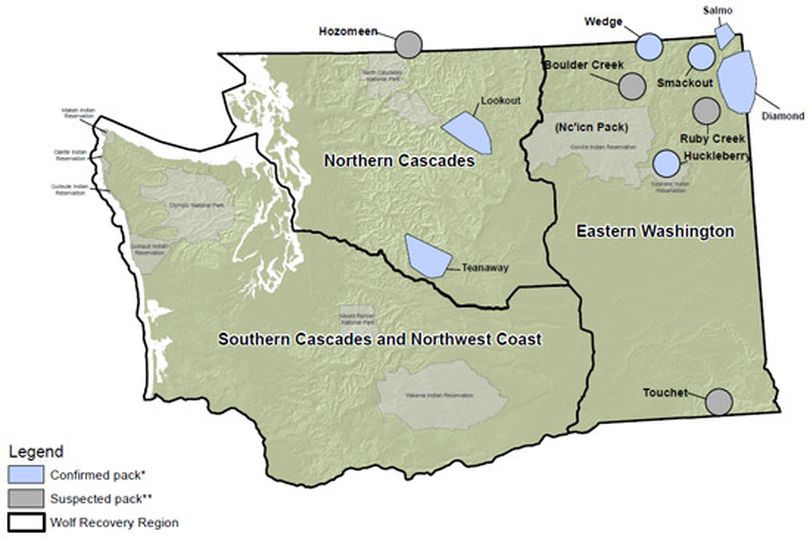Wolves launch more attacks on Stevens County cattle

ENDANGERED SPECIES -- Another confirmed wolf attack on cattle in northern Stevens County is prompting the Washington Fish and Wildlife Department to consider more lethal action and possibly breaking up the Wedge Pack near the Canada border.
Department officers confirmed on Tuesday that a Diamond M Ranch calf was attacked by wolves on a Colville National Forest grazing lease in "the wedge" area between the Columbia and Kettle Rivers. Today officers are responding to reports from the ranchers that two more calves were killed, said Madonna Luers, department spokeswoman.
If verified, the ranch operated by the McIrvin family will have had at least three calves injured and three killed in four weeks. The ranch grazes about 400 cattle in the area during summer.
"Basically, cows, big-game and wolves are everywhere in that area," Luers said.
In mid-July, officials confirmed that wolves had injured a cow and calf and killed another calf from the northern Stevens County ranch.
A female non-breeding wolf was killed by department officers on Aug. 7 in an attempt to disrupt the wolf pack's pattern of targeting livestock. The kill was the first by the agency under its wolf management plan adopted in 2011.
Gray wolves are protected in Eastern Washington by the state endangered species laws.
One male wolf trapped and released from the Wedge Pack (one of eight confirmed packs in Washington) is wearing a GPS tracking device that helps the agency monitor the wolf pack's movements. Starting Monday, agency biologists will attempt to trap and put tracking collars on more of the wolves.
"We're going to try to thoroughly document their range and what they're doing," Luers said. "After that, we'll decide which way to go. Everything's on the table, including removing more wolves and trying to disperse the pack."
In a report just filed by Capital Press online, rancher Len McIrvin suggests the Wedge Pack will need to be taken out.
There are so many wolves now, he said, the only acceptable option is trapping and poison.
Compensation is not the answer, McIrvin said, because the proposed fund is for a maximum of 10 ranches to receive $5,000.“We’d use up the $50,000 ourselves,” McIrvin said. “We’ll still have the wolves and they’ll still put us out of business if we don’t eliminate them.”
McIrvin reported a loss of 11 calves and five bulls last year. Not all of the losses were confirmed kills by wolves. At least a few have been confirmed as cougar kills. But McIrvin expects the cattle losses go to up this year.
- See my recent column for background on wolf attacks and management in Washington.
- See the latest update and details on the Wedge Pack issues from Andy Walgamott of Northwest Sportsman.
